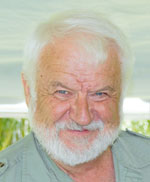Hearts at Work
A Column by James Tipton
“…this is the best season of your life.”

While pondering this, I also began to realize that I do not really believe in aging. I do believe we are spiritual beings, immortal, sojourning in space and time, and during this fascinating and sometimes complicated dance between birth and death, hopefully we are also awakening to Self- and God-realization.
I opted, finally, to talk about the “Poetry of Aging,” and I do know at least a little about poetry. I like in particular some of the ancient Chinese and Japanese poetry written by Buddhists and Taoists, many of whom, as they grew older, chose to leave, detach from, the world of external values to seek the internal values that might lead to liberation. After I gave the talk, I returned home and spent a lazy afternoon rediscovering the joy of lots of those old poems I once loved.
Seng-Ts’an (?-606), the “Third Founding Teacher of Zen,” instructs us that: “The Great Way isn’t difficult for those who are unattached to their preferences. Let go of longing and aversion, and everything will be perfectly clear.” He concludes this particular passage thusly: The mind of absolute trust is beyond all thought, all striving, is perfectly at peace, for in it there is no yesterday, no today, no tomorrow.”
Li Po (712-770), like so many early Chinese poets, loved the mountains, and he writes contemplatively about them: “We sit together, the mountain and me, until only the mountain remains.” (Legend has it that Li Po died drunk while trying to embrace the moon in the Yellow River.)
Tu Fu (712-770), perhaps the most famous of the early Chinese poets, believed so much in the power of poetry that he even prescribed his own for the treatment of malaria. In spring in the mountains he visits the hermitage of a monk:
“You want nothing, although at night
You can see the aura of gold
And silver ore all around you.
You have learned to be gentle
As the mountain deer you have tamed.
The way back forgotten, hidden
Away, I become like you,
An empty boat, floating, adrift.
Aging well, then, for these early poets includes leaving the busy world behind, living in harmony with totally ordinary daily affairs, realizing as Layman P’ang (c.740-808) discovers, “Even the poorest thing shines” and that “you are neither holy nor wise, just an ordinary fellow who has completed his work.” What truth we may find is inside, and as Tung-Shan (807-869) tells us, “If you look for the truth outside yourself, it gets farther and farther away.”
All of these poets seem to be asking, “What’s the use of cluttered houses, and cluttered minds? So much clutter that we can no longer experience a mountain, the moon, the scent of jasmine, our own hands.” I think I’ll include with a favorite of mine, by Wu-Men (1183-1260):
Ten thousand flowers in spring, the moon in autumn,
a cool breeze in summer, snow in winter.
If your mind isn’t clouded by unnecessary things,
this is the best season of your life.
- April 2024 – Issue - March 31, 2024
- April 2024 – Articles - March 31, 2024
- April 2024 - March 31, 2024








